The OCZ Vertex 3 Review (120GB)
by Anand Lal Shimpi on April 6, 2011 6:32 PM ESTRandom Read/Write Speed
The four corners of SSD performance are as follows: random read, random write, sequential read and sequential write speed. Random accesses are generally small in size, while sequential accesses tend to be larger and thus we have the four Iometer tests we use in all of our reviews.
Our first test writes 4KB in a completely random pattern over an 8GB space of the drive to simulate the sort of random access that you'd see on an OS drive (even this is more stressful than a normal desktop user would see). I perform three concurrent IOs and run the test for 3 minutes. The results reported are in average MB/s over the entire time. We use both standard pseudo randomly generated data for each write as well as fully random data to show you both the maximum and minimum performance offered by SandForce based drives in these tests. The average performance of SF drives will likely be somewhere in between the two values for each drive you see in the graphs. For an understanding of why this matters, read our original SandForce article.
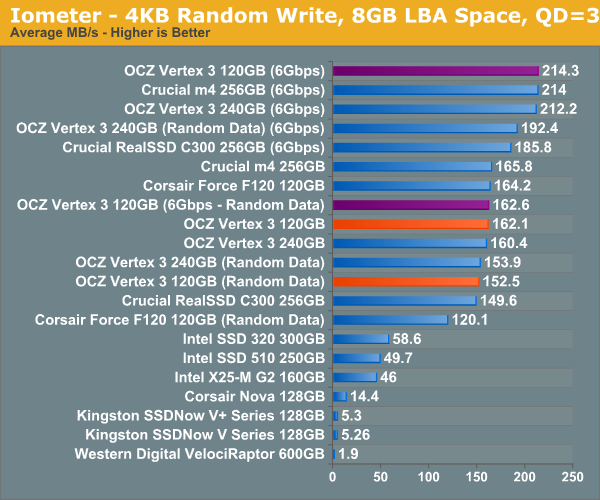
Peak performance on the 120GB Vertex 3 is just as impressive as the 240GB pre-production sample as well as the m4 we just tested. Write incompressible data and you'll see the downside to having fewer active die, the 120GB drive now delivers 84% of the performance of the 240GB drive. In 3Gbps mode the 240 and 120GB drives are identical.
Many of you have asked for random write performance at higher queue depths. What I have below is our 4KB random write test performed at a queue depth of 32 instead of 3. While the vast majority of desktop usage models experience queue depths of 0 - 5, higher depths are possible in heavy I/O (and multi-user) workloads:
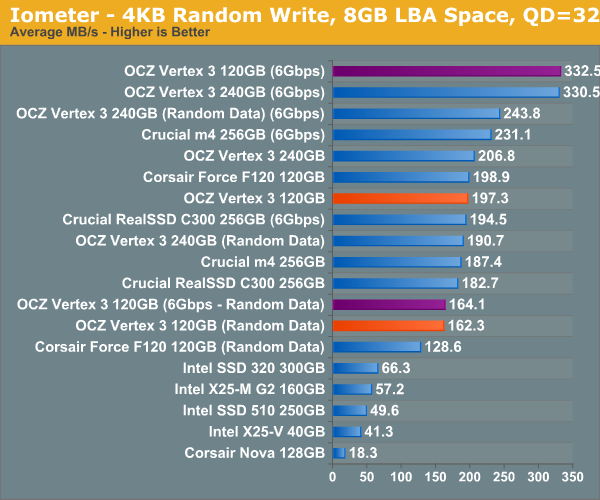
At high queue depths the gap between the 120 and 240GB Vertex 3s grows a little bit when we're looking at incompressible data.
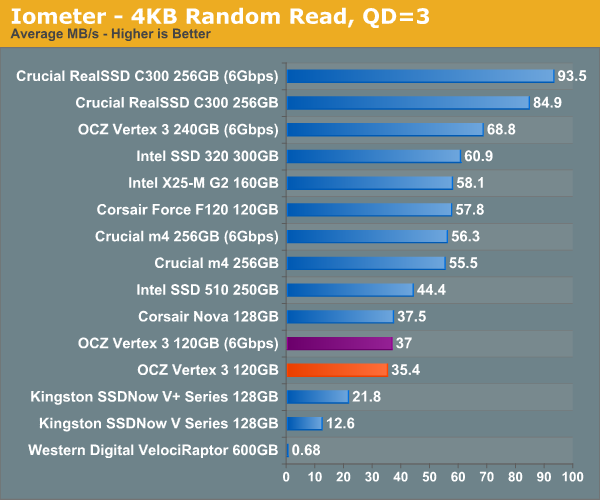
Random read performance is what suffered the most with the transition from 240GB to 120GB. The 120GB Vertex 3 is slower than the 120GB Corsair Force F120 (SF-1200, similar to the Vertex 2) in our random read test. The Vertex 3 is actually about the same speed as the old Indilinx based Nova V128 here. I'm curious to see how this plays out in our real world tests.
Sequential Read/Write Speed
To measure sequential performance I ran a 1 minute long 128KB sequential test over the entire span of the drive at a queue depth of 1. The results reported are in average MB/s over the entire test length.
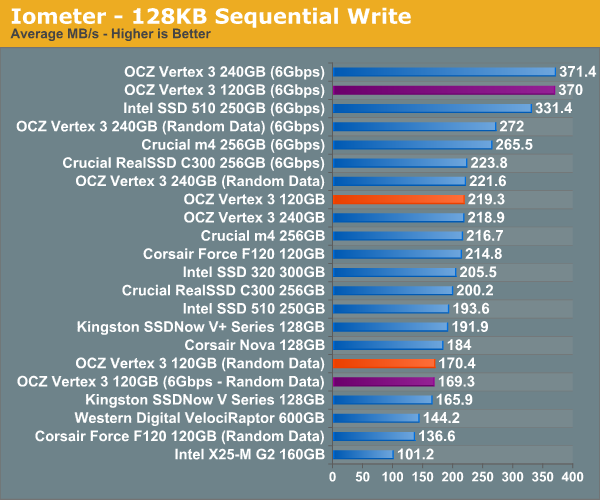
Highly compressible sequential write speed is identical to the 240GB drive, but use incompressible data and the picture changes dramatically. The 120GB has far fewer NAND die to write to in parallel and in this case manages 76% of the performance of the 240GB drive.
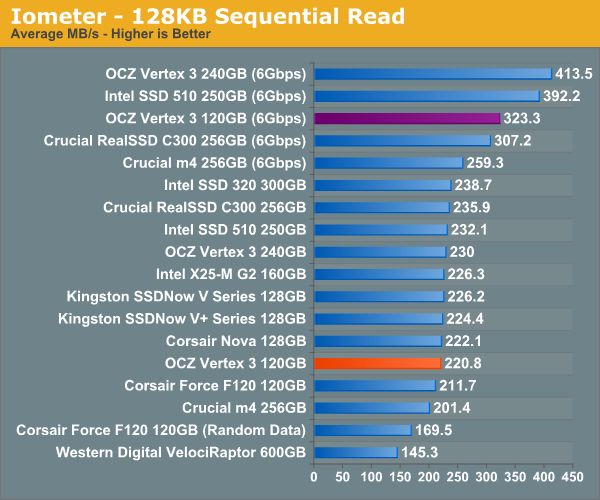
Sequential read speed is also lower than the 240GB drive. Compared to the SF-1200 drives there's still a big improvement as long as you've got a 6Gbps controller.










153 Comments
View All Comments
rarmstrongtaeus - Tuesday, May 8, 2012 - link
Hello, I am looking for any OCZ, or other SSD for that matter, that has the Hynix H27UBG8T2ATR NAND devices as shown in the image above. I am willing to pay a bounty of $500 plus the original cost of the drive for one of these drives as long as it is still functional. Please contact me at 719-306-5539jamesearlywine - Monday, October 22, 2012 - link
I bought a vertex 2, and within 3 months the drive just stopped working. I was able to get a replacement from OCZ because the drive was under warranty, but I lost data.I recently bought a vertex 3 about 8 months ago, a couple months ago the drive began disappearing. My laptop would freeze, and when it rebooted, it didn't detect the vertex 3.
I've heard there's a firmware upgrade that might fix this, but I have to backup the drive, install the firmware, then restore from system image.
If you buy an OCZ vertex 2 or 3, make sure to backup your data regularly. I have been severely disappointed by how unreliable these drives are, I bought two, and both purchases have been bad experiences.
axelsp76 - Thursday, June 5, 2014 - link
Hi Anand and everyone!! Thanks very much for this site. The amount of articles/comments here mesmerizing!Im having an issue with data transfer rates, and I cant get my head around it.
I really wanted to have better transfer rates on my desktop. Im not looking at RAID config at this stage.
I was hoping to get way above the 130 MB/s mark specially using sata III ports on my onboard Intel controller.
The motherboard is EVGA x79 Dark. And although I see spikes of 350MB/s on the first 3 seconds of the transfer rate (windows 8.1 copy details), its safe to say that most of the transfer is done at 130MB/s.
The BIOS has AHCI and ACPI enabled, and I checked that prior to the OS install.
Partition alignment on both drives seems to be ok (offset divisible by 4096) and both drives are about 1/3 from they total capacity. Both are 'twins' 120GB vertex 3 OCZ, purchased in one lot (but already about 3 years old)
The test i did was to transfer a 8Gb folder from SSD to the other. The difference I noted btwn copying a 8gb folder against a 8gb file is that in my case, the first 3 seconds are stable at 300+MB/s for the folder transfer, then it quickly drops to +-120MB/s till the end of the transf.
After reading this article, Im still unsure if I should go for another SSD brand (Samsung 840 pro or EVO), try an external sata controller.
Thanks!